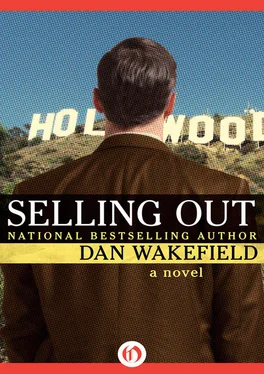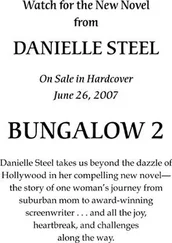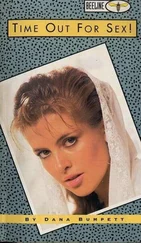He felt ashamed that he had put her down for seeming so motherly. Right now, he would take all the motherly warmth and comfort he could get. And she exuded it. She made him feel secure, almost at peace, simply by being in her presence. She looked, if anything, more motherly now than she had at the party—or at least more traditionally motherly, in the old-fashioned sense. She did not look so much like Sada Thompson playing the mother in “Family” now; without Ms. Thompson’s bright lipstick, she reminded Perry more of one of those Norman Rockwell mothers. Her makeup was so faint and artful as to seem like a natural blush. Her smile was serene, reassuring. Perry would not have been at all surprised if she had reached out onto the air-conditioner outside her office window and pulled in a fresh apple pie.
The story she wanted to do as a TV movie was a story about death.
Perry perked up. At least that was serious. It was something in fact he felt very in tune with these days.
It was not about a man, but that didn’t lessen Perry’s interest. It was the story of a young woman who learns her father is dying of cancer. She has never been close to him, yet she sacrifices not only her career by leaving her important job with no advance notice, she breaks off an engagement with a man she loves, all in order to be with her father during his last days.
Before she continued, Mona said, “I have waited for the right person to do this story. It’s very important to me. The fact that you might be the one to write it would be like a dream come true.”
“Thank you,” Perry said.
He felt all right about himself for the first time in a long time. He felt almost as worthwhile as he had before he came to Hollywood.
Mona stood and came around her desk and pulled a chair up next to him.
“I want to confess to you,” she said, “the real reason I want to do this story.”
“I’d like to know,” Perry said.
Mona nodded, and took a deep breath.
“I was born and grew up in a small town in Nebraska,” she said. “I was an only child. The daughter of a judge. He was a stern man, remote and godlike. I was afraid of him. I clung to my mother. When I went off to college, my father developed a terminal cancer. He asked me to come home, to be with him in his last months of life. I would have had to take a semester off college. Leave my boyfriend. My sorority sisters. My plans. I was frightened. I refused. I turned away from my own father when he was dying.”
Mona took out a handkerchief. She wiped at her eyes, then blew her nose.
“What I want to do now,” she said, “is tell the story of a daughter who made the decision I wish that I had made myself. A daughter who sacrifices her own wishes and desires for the sake of comforting her father, even though she’s never been close to him. Of course, she will become close to him—in our story. It would be like a kind of atonement, I suppose. It would be like showing others a better way to behave than I did. And it would, most of all, I hope, be a tribute to my father.”
When she finished, Perry had to wipe his own eyes.
“It would be an honor,” he said, “to try to do justice to that story.”
To make the situation even better, the story had been presold to Judd Wizener, known as one of the most perceptive and kindly men in television, the head of TV and movies for his network. Mona was sure he’d be delighted to have Perry as the writer.
Perry called Ravenna and told her he had found “the perfect wave.”
The deal was struck quickly. He would only get $35,000, in three payments, but that was not the point. The point was at last he had a subject worthy of a real writer. It fit something he had forgotten, some words of Yeats about doing only those things you could be proud of, and count all else “extravagance of breath.”
Yes.
Now all he had to do was write a treatment for approval by the network before he began the actual script.
Perry got right down to work.
It was hard. It was hard to capsulize a real story like this, hard to put it in TV terms. He found himself struggling. Damn. If he couldn’t do this one with all the circumstances right he might as well give up.
He smoked a little grass, but that didn’t help.
He knew that Mona was anxiously waiting to hear, to have him get going on her dream project.
Finally, one night in frustration, he remembered Archer Mellis’s original words of advice.
“Don’t even think about television.”
Yes! That was it, that was the key. He was worrying too much about pleasing the preconceived pap notions of network people. That was crazy. This was going to be read by the sympathetic eyes of Mona and then of the kindly Judd Wizener.
Perry had a beer and went to his typewriter. He poured out his deepest feelings about this story, not just the plot but the heart of it, his vision of it. He wrote all night, stopping only to have more beers, but not getting drunk, just keeping going, just like the old days. It was like staying up with a great story that ran its own course, that wrote itself!
At dawn he had twenty-two pages that were like a letter to Mona. He showered, shaved, and took it in person to her office. He heard back from her two hours later.
She loved it.
She was sending it over to the network right away.
When Perry hung up the phone he smiled and took a deep breath, then another. He felt he could really breathe again. He went to the kitchen and made a cup of instant coffee, feeling clean and sharp. He should have been bushed, but he felt more alive than he had for months. He didn’t want to go to bed. He wanted to do something, wanted to take some kind of action, now that he felt capable of such a thing.
He called Ned Gurney. He had missed him enormously, but feared if he called after the news that Ned finally got his feature going, it would sound like the worst kind of sucking up. Now that Perry had something hot of his own in the works he felt it was all right to call Ned. He invited him to lunch at the place where Ned had first taken him when they met, the restaurant in Westwood that reminded Perry of the Copley Plaza in Boston.
Ned was gracious, as always. Perry apologized to him about breaking his word on the option of “The Springtime Women,” and Ned admitted that it had hurt, but he had put it behind him. Perry said he didn’t think anything was going to come of it anyway. Poetic justice, maybe, for his being so underhanded in the greedy effort to get it made. Ned merely shrugged.
“You know what that piece should really be?” Ned asked.
“Maybe it should just be what it is,” Perry said. “A short story.”
“Maybe. But in dramatic terms, it really should be a play.”
“You think it could be?”
“Of course. You could do a beautiful job with it. And on the stage, you as the writer would really have control.”
“I’ve heard that,” Perry said. “What an amazing thing it sounds like. It’s almost worth writing a play just to have that experience.”
“Especially after your recent experience, I bet.”
“Yes. But now I’ve really got my teeth into something good.”
He told Ned about Mona and the story of the daughter whose father is dying, and Ned was very pleased that Perry had something of substance to work on, and a good producer to work with.
“I hope someday,” Perry said, “I might even get to work with you again.”
“I’d like that,” Ned said. “Who knows, we might even do something back East, on Broadway.”
“You think you might go back?”
“I miss it,” Ned said. “‘Spoons’ is going well, and of course I have high hopes for it, but I think I’ll be able to use a change of pace when it’s finally finished.”
Perry nodded. He didn’t want to ask anything more specific or try to make any real plans that might seem impossible, for he didn’t want to break the spell. It was as if, in that room with its Boston aura, they were temporarily back East, up in the right-hand corner of the national weather map, where snow fell softly in winter and leaves turned red in the fall.
Читать дальше












